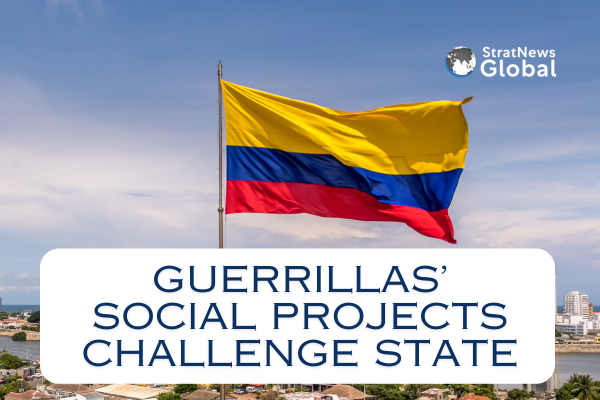A group of children holding red, yellow and blue balloons – the colors of Colombia’s flag – run to the playground of a newly-opened school
built and paid for by guerrillas of the Estado Mayor Central, reports Reuters.
The new school – which opened last month in a troubled area in the country’s south – is just one example of how the group is consolidating control of certain regions, gaining social support and territorial dominance, and potentially stymieing already-fraught efforts by President Gustavo Petro to ink a new peace deal.
The 3,500-strong guerrillas of the Estado Mayor Central (EMC) are rebels who rejected a landmark 2016 peace deal with the government that largely put an end to decades of conflict. Dissidents from the Revolutionary Armed Forces of Colombia (FARC), they remain armed and committed, they say, to Marxist ideals like wealth and land redistribution.
The EMC’s construction of a pseudo-state – building clinics, roads and bridges – is a strategy to bring it closer to local people in places with minimal state presence, government officials, security sources and analysts say, giving the rebels a stronger position at the negotiating table.
Control of territory also allows the EMC to expand drug trafficking and illegal mining, funding its armed operations, the security sources said, hurting U.S. and Colombian anti-drug efforts and damaging fragile Amazon ecosystems.
As in other countries where guerrillas or criminal groups have filled a void of state presence, their efforts have sowed distrust of security forces, said a high-ranking army official who asked to remain anonymous.
But the EMC says they are bringing benefits to marginalized communities.
“It’s a dream … for the communities,” EMC second-in-command Alexander Diaz Mendoza, better known by his nom de guerre Calarca Cordoba, told Reuters at the school opening. “Especially for this region which has been excluded by the state.”
The EMC, which entered peace talks with the Petro government last year, inherited the pseudo-state building practice from its predecessor the FARC, which demobilized under the 2016 peace deal. It is now Colombia’s third-largest armed group.
Around 13,000 people demobilized under the FARC deal, which mandated the group’s leaders face war crimes investigations, but other armed groups – including crime gangs, dissidents like the EMC and the National Liberation Army (ELN) rebels – remain active, counting some 17,600 members between them.
Petro has promised to end the 60-year conflict, which has killed 450,000 people, through new peace deals, but he is confronting significant hurdles, including the partial suspension of a ceasefire with the EMC.
Thirty eight years in journalism, widely travelled, history buff with a preference for Old Monk Rum. Current interest/focus spans China, Technology and Trade. Recent reads: Steven Colls Directorate S and Alexander Frater's Chasing the Monsoon. Netflix/Prime video junkie. Loves animal videos on Facebook. Reluctant tweeter.





